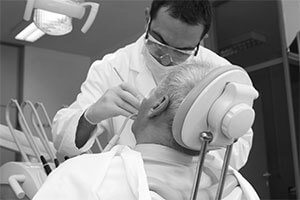
A dental extraction, also known as exodontia, is one of the most common procedures performed at a dentist’s office. The procedure involves removing or pulling a tooth. Dentists will attempt to treat related oral conditions to save the tooth, but this is not always possible or effective, and in some cases, an extraction may be necessary.
Reasons for Dental Extractions
Dental extractions may be performed to minimize teeth overcrowding or in preparation for braces. An extraction may also be performed to remove the following types of teeth:
- Wisdom teeth
- Decayed teeth
- Broken teeth
- Loose teeth
What Are the Chances of Permanent Nerve Damage from Wisdom Teeth?
Wisdom tooth extraction is a common dental procedure performed to alleviate pain, discomfort, or potential complications associated with these third molars. However, like any medical or dental procedure, there are risks involved.
One of the potential risks associated with wisdom tooth extraction is nerve damage. The inferior alveolar nerve, which runs near the lower wisdom teeth, can sometimes be affected during the extraction process. Nerve damage can result in temporary or, in some cases, permanent issues such as numbness, tingling, or pain in the lower lip, chin, or tongue.
The chances of permanent nerve damage from wisdom teeth extraction are relatively low, but they are not zero. The risk factors for nerve damage may include the tooth’s position, the patient’s age, the experience of the oral surgeon or dentist, and the complexity of the extraction.
If you or a loved one has experienced permanent nerve damage following wisdom tooth extraction due to potential malpractice, it’s crucial to consult with an experienced dental extraction malpractice lawyer in NYC. They can assess your case, determine liability, and help you seek compensation for your injuries.
What Percent of Wisdom Teeth Extractions Go Wrong?
Wisdom tooth extraction is generally considered a safe and routine dental procedure when performed by qualified and experienced oral surgeons or dentists. Most extractions are successful and without complications.
However, it’s important to recognize that no medical or dental procedure is entirely risk-free. Complications can arise, but the likelihood of these complications going wrong depends on several factors, including the patient’s individual health, the complexity of the procedure, and the skill of the practitioner.
The percentage of wisdom teeth surgeries that go wrong is relatively low, but these complications can include infection, bleeding, nerve damage, dry socket, and injury to adjacent teeth. The actual risk of complications going wrong varies from case to case.
If you believe that your wisdom tooth extraction resulted in complications due to negligence, improper care, or dental malpractice, it’s essential to consult with a dental extraction malpractice lawyer in NYC.
The Dental Extraction Procedure
After the dentist has decided that dental extraction is necessary, an X-ray examination will be completed to further evaluate the tooth. The extraction procedure is performed under local anesthesia to minimize discomfort. There are two types of dental extractions:
Simple Extraction
A simple extraction is usually performed on a tooth that can be seen in the mouth. It is commonly performed by a dentist that uses forceps to remove the tooth.
Surgical Extraction
More complex extractions may need to be performed by an oral surgeon. Surgical extraction is commonly performed on teeth that have broken at the gum line or have not descended into the mouth, such as wisdom teeth. This procedure may require general anesthesia.
Complications from a Dental Extraction
The dental extraction procedure is safe for most patients with minimal to no complications. While most complications are rare, they may include:
- Accidental damage to surrounding teeth
- Fractured jaw
- Soreness in the jaw
- Dry socket or exposure of bone in the tooth socket
- Infection
Recovery from a Dental Extraction
After the extraction, patients may experience a certain amount of pain. The pain may be relieved by:
- Applying ice to the external area
- Rinsing with warm salt water
- Taking anti-inflammatory medication
Antibiotics may be prescribed to fight infection. Patients are also advised to avoid certain foods.
Most patients recover completely from a dental extraction within one to two weeks.
